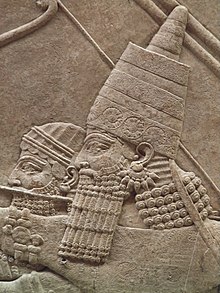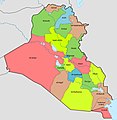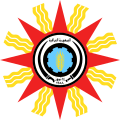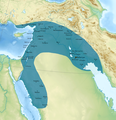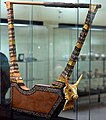
Back بوابة:العراق Arabic প্রবেশদ্বার:ইরাক Bengali/Bangla دەروازە:عێراق CKB Portal:Irak Spanish Portail:Irak French Portal:Iraq Malay Portal:Iraque Portuguese Портал:Ирак Russian Portal:Irak Turkish باب:عراق Urdu
The Iraq PortalA Panoramic view of Baghdad
Iraq, officially the Republic of Iraq, is a country in West Asia and a core country in the geopolitical region known as the Middle East. With a population of over 46 million, it is the 30th-most populous country. It is a federal parliamentary republic that consists of 18 governorates. Iraq is bordered by Turkey to the north, Saudi Arabia to the south, Iran to the east, the Persian Gulf and Kuwait to the southeast, Jordan to the southwest, and Syria to the west. The capital and largest city is Baghdad. Iraqi people are diverse; mostly Arabs, as well as Kurds, Turkmen, Yazidis, Assyrians, Armenians, Mandaeans, Persians and Shabakis with similarly diverse geography and wildlife. Most Iraqis are Muslims – minority faiths include Christianity, Yazidism, Zoroastrianism, Mandaeism, Yarsanism and Judaism. The official languages of Iraq are Arabic and Kurdish; others also recognized in specific regions are Turkish, Suret, and Armenian. Modern Iraq dates back to 1920, when a British-backed monarchy under Faisal was established, followed by an independent Kingdom in 1932. It was overthrown in 1958 by General Qasim, who established and ruled a republic until he was overthrown in 1963. Iraq was then ruled by brothers Abdul Salam Arif and Abdul Rahman Arif. The Ba'ath party took power in a 1968 coup, first led by Ahmed Hassan al-Bakr and then by Saddam Hussein. Under Saddam, the country fought the Iran–Iraq War and the Gulf War. In 2003 United States-led coalition forces invaded and occupied Iraq, overthrowing Saddam's regime. The war continued as an insurgency and sectarian civil war, which lasted until 2011. Continuing discontent over Nouri al-Maliki's government led to protests, after which a coalition of Ba'athist and Sunni militants launched an offensive against the government, initiating full-scale war in Iraq. The climax of the campaign was an offensive in Northern Iraq by the Islamic State (ISIS) that marked the beginning of the rapid territorial expansion by the group, prompting an American-led intervention. Iran also intervened and expanded its influence through sectarian Khomeinist militias. By the end of 2017, ISIS had lost all its territory in Iraq. Post-war conflict continues at a lower scale to this day. (Full article...) Selected article -Yazidis, also spelled Yezidis (/jəˈziːdiz/ ; Kurdish: ئێزیدی, romanized: Êzidî), are a Kurdish-speaking endogamous religious group who are indigenous to Kurdistan, a geographical region in Western Asia that includes parts of Iraq, Syria, Turkey and Iran. The majority of Yazidis remaining in the Middle East today live in Iraq, primarily in the governorates of Nineveh and Duhok. There is a disagreement among scholars and in Yazidi circles on whether the Yazidi people are a distinct ethnoreligious group or a religious sub-group of the Kurds, an Iranic ethnic group. Yazidism is the ethnic religion of the Yazidi people and is monotheistic in nature, having roots in a pre-Zoroastrian Iranic faith. (Full article...)Selected pictureDate palm orchards in Babylon Did you know...
Selected biography -Ashurbanipal (Neo-Assyrian Akkadian: 𒀸𒋩𒆕𒀀, romanized: Aššur-bāni-apli, meaning "Ashur is the creator of the heir") was the king of the Neo-Assyrian Empire from 669 BC to his death in 631. He is generally remembered as the last great king of Assyria. Ashurbanipal inherited the throne as the favored heir of his father Esarhaddon; his 38-year reign was among the longest of any Assyrian king. Though sometimes regarded as the apogee of ancient Assyria, his reign also marked the last time Assyrian armies waged war throughout the ancient Near East and the beginning of the end of Assyrian dominion over the region. Esarhaddon selected Ashurbanipal as heir c. 673. The selection of Ashurbanipal bypassed the elder son Shamash-shum-ukin. Perhaps in order to avoid future rivalry, Esarhaddon designated Shamash-shum-ukin as the heir to Babylonia. The two brothers jointly acceded to their respective thrones after Esarhaddon's death in 669, though Shamash-shum-ukin was relegated to being Ashurbanipal's closely monitored vassal. Much of the early years of Ashurbanipal's reign was spent fighting rebellions in Egypt, which had been conquered by his father. The most extensive campaigns of Ashurbanipal were those directed towards Elam, an ancient enemy of Assyria, and against Shamash-shum-ukin, who gradually began to resent the overbearing control that his younger brother held over him. Elam was defeated in a series of conflicts in 665, 653 and 647–646. Shamash-shum-ukin rebelled in 652 and assembled a coalition of Assyria's enemies but was defeated and died during Ashurbanipal's siege of Babylon in 648. On account of a lack of surviving records, much of Ashurbanipal's late reign is poorly known. (Full article...)
General imagesThe following are images from various Iraq-related articles on Wikipedia.
ListsTopicsCategoriesRelated portalsReligions in Iraq States Other states WikiProjectsThings you can do
Associated WikimediaThe following Wikimedia Foundation sister projects provide more on this subject:
Discover Wikipedia using portals | ||||||||
© MMXXIII Rich X Search. We shall prevail. All rights reserved. Rich X Search






